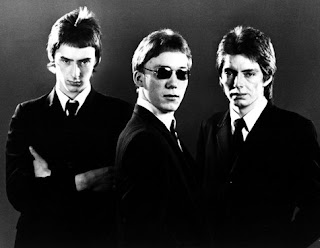In a way, this series might be a bit redundant. One could argue that most '80s music is Yuppie Rock. In fact, one could argue that Yuppie Rock is merely an extension of Yacht Rock; the two genres may, in a sense, be indistinguishable. But for my purposes, I would suggest the difference in this fashion: while the term "Yacht Rock" conjures up images of mellow suburbia in general, and Southern California in particular, "Yuppie Rock" conjures up images of fast-paced urban living in general, and New York City in particular. If Yacht Rock is "smooth," Yuppie Rock is "sharp." Yuppie Rock is a little more "tightly wound." Yacht Rock was still suffering from a bit of a '70s hangover. Yuppie Rock crushed all those pet rocks into fine Colombian powder and shoved it directly up Jimmy Carter's ass.
Just what is a yuppie, anyway? Dictionary.com defines "yuppie" as "a young, ambitious, and well-educated city-dweller who has a professional career and an affluent lifestyle." Can't argue with that. I was always under the impression that "yuppie" stood for "young urban professional," but according to Wikipedia, pinning down the actual origin of the term is a thornier matter:
Joseph Epstein was credited for coining the term in 1982, although this is contested and it is claimed that the first printed appearance of the word was in a May 1980 Chicago magazine article by Dan Rottenberg. The term gained currency in the United States in 1983 when syndicated newspaper columnist Bob Greene published a story about a business networking group founded in 1982 by the former radical leader Jerry Rubin, formerly of the Youth International Party (whose members were called yippies); Greene said he had heard people at the networking group (which met at Studio 54 to soft classical music) joke that Rubin had "gone from being a yippie to being a yuppie". The headline of Greene's story was From Yippie to Yuppie. East Bay Express humorist Alice Kahn claimed to have coined the word in a 1983 column ... The proliferation of the word was affected by the publication of The Yuppie Handbook in January 1983 (a tongue-in-cheek take on The Official Preppy Handbook), followed by Senator Gary Hart's 1984 candidacy as a "yuppie candidate" for President of the United States. The term was then used to describe a political demographic group of socially liberal but fiscally conservative voters favoring his candidacy. Newsweek magazine declared 1984 "The Year of the Yuppie", characterizing the salary range, occupations, and politics of yuppies as "demographically hazy".So, like "Generation X," "Yuppie" is is essentially an amorphous journalistic invention that can be pulled out of a hat for cheap rhetorical effect when the situation calls for it. Well, if "yuppie" can be exploited as a nebulous term of cultural shorthand, wait 'til you see what I do with "Yuppie Rock."
Yuppie Rock is sort of like pornography: I know it when I see it. And yet, there seems to be a unifying contradiction at the heart of the genre. Although its target audience may have been conservative, most Yuppie Rock musicians themselves were quite liberal. For every nine generically romantic love songs, there was always one Political song with a capital P. So, if you're amused by the spectacle of white people holding their guilt in one hand and a latte in the other, then roll up your sleeves, folks, because we are going to have a good time.









